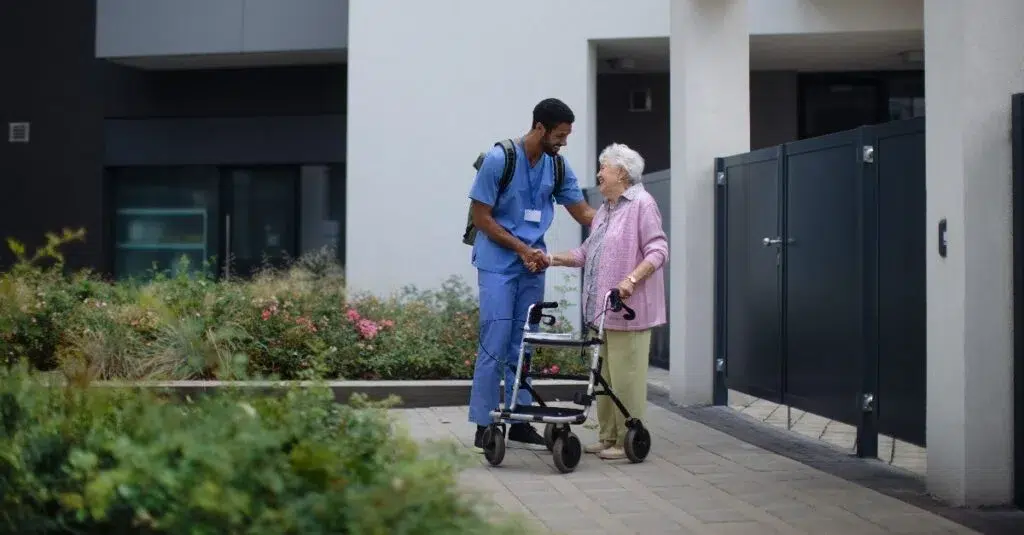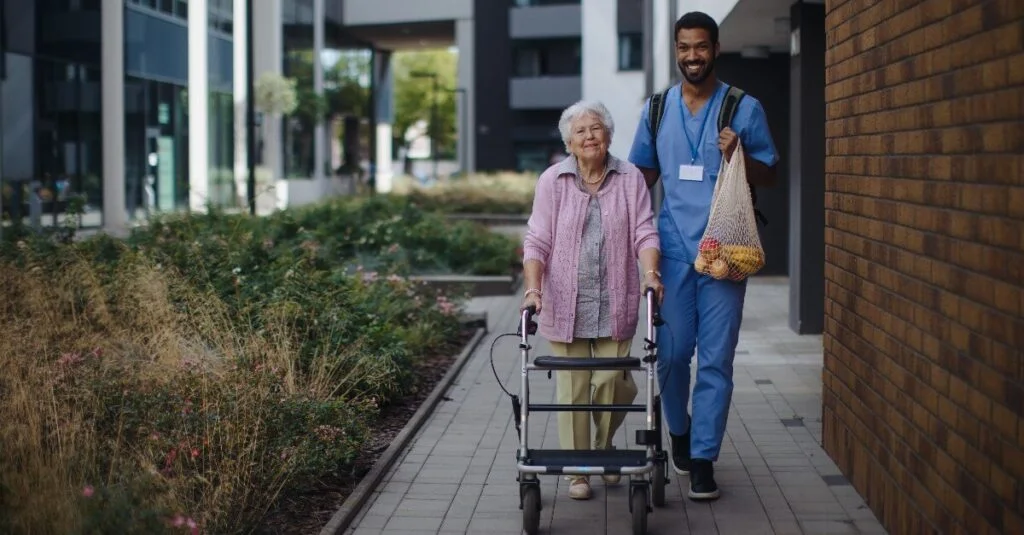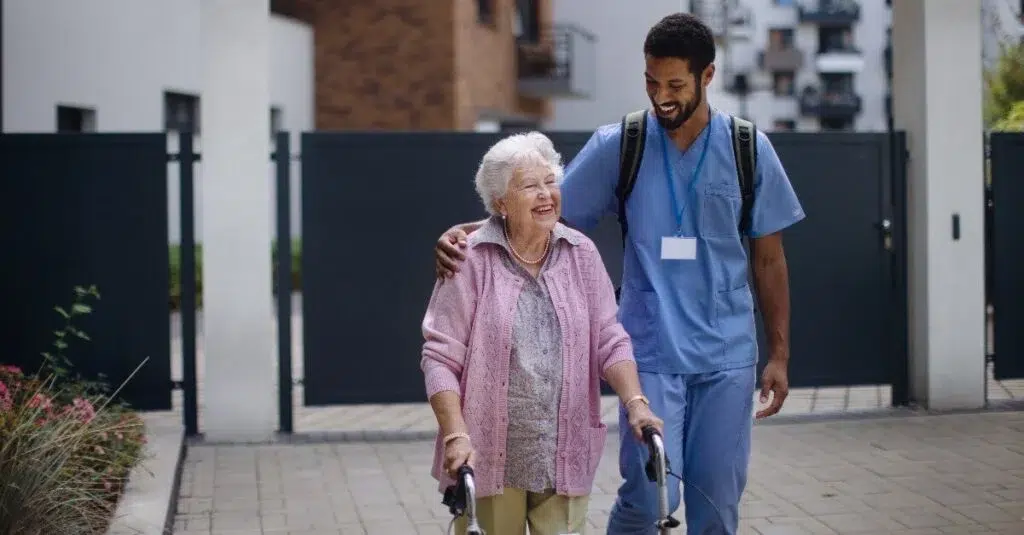What is Personal Care?
Personal care is the home care and support of everyday living tasks, such as maintaining private hygiene, toileting, washing, grooming, dressing and taking care of personal appearance.
Personal hygiene plays an essential role in keeping a healthy and happy mindset.
Although older persons may be reluctant to accept assistance with personal hygiene, the benefits of doing so usually outweigh the disadvantages.
Personal Care Services
Personal care is a specialised care service tailored to the individual’s needs. When working with individuals who require personal care, the work involves other people in their care, such as social workers, medical specialists, or family members, to create a personalised care plan that specifies their personal needs and the carers’ responsibilities. The service of personal care at home includes:
- Assistance with getting up and going to bed
- Preparing meals and helping with feeding if necessary
- Help with housework duties, washing up, cleaning and laundry
- Bathing, showering and oral hygiene
- Personal hygiene, haircare, shaving, nails
- Applying creams and lotions as required
- Dressing up and bed positioning
- Assisting with toileting
- Preparing and administering medication
- Support a movable bed positioning to stretch and avoid bedsores
- Ostomy or catheter bag maintenance, as well as any other type of healthcare intervention
Personal Care Options
One of the most apparent benefits of providing personal care in the comfort of your home is receiving care and support from a carer instead of multiple carers on a larger care team.
Given the uniqueness of this type of home care, it gives you peace of mind knowing that the same carer, who needs to understand you and your needs, will be there to support you. This kind of personal care is designed to serve the routines of your loved one.

Visiting Care
People who need some extra assistance with everyday activities and care at home can benefit from visiting care or domiciliary care. A visiting carer can make a significant impact with just a half-hour visit once a week up to multiple visits a day, every day.
Live-in Care
Live-in care provides consistent, round-the-clock assistance from a specialist-trained carer who lives with you in your home and is always on call, available 24/7 a day to assist.
Respite Care
Primary carers receive short-term relief from respite care. It can be planned for a few days or weeks or simply an afternoon. Care can be provided as home care or hospital care.
Elderly Care
Elderly care is a range of services designed to help older people lead comfortable living leading to more independence with the support of a carer to attend to their day-to-day needs.
End-of-Life Care
End-of-life care is the support, medical assistance, and care given to people during the times surrounding the last months or years of their lives.
Why Do People Require Personal Care Services?
People may need personal care services due to many challenges, for example, assistance due to mobility difficulties. They require support and personal care assistance with daily tasks because it can be difficult for them to get out of bed or take a bath on their own. Other people may have trouble remembering certain tasks. For example, if the person has a diagnosis of dementia or if there is daily medication management.
Some people might require round-the-clock home care support, while others may need short visits a few times a week. Each person receives personalised care and support that is tailored to their needs. It is essential to do an assessment before developing their care plan to identify and consider their precise needs as well as any special interests, personal hobbies, and routines.
Care plans are vital and are constantly updated and modified at scheduled times. The care and support of our clients at Unique Community Services are our priority. Our home personal care services provide our clients with the independence to live their lives with respect and dignity. Our mission is to provide and arrange a fulfilling life that impacts their overall health and well-being from highly-trained clinicians with the highest standards of care services.
What is a Personal Care Assistant?
A personal care assistant helps with daily tasks at home or in a care centre to provide the needed support for the elderly, recovering, or disabled individuals with daily tasks. Also known as carers, personal care assistants’ tasks include helping with bathing, shaving, washing, feeding, and driving clients to visits. They might also be required to help with some simple housework tasks, like tidying up.
The duties and responsibilities of a personal care assistant may include the following:
- Help with dressing, grooming, and washing.
- Medication management and monitoring of conditions.
- Cleaning and organising, including disinfecting procedures.
- Provide social care and support by accompanying clients to visits or going with them on outings to cafes or supermarkets.
- Updating other healthcare professionals on reports that are maintained.
- Help with mobility and minor physiotherapy activities.
- Adhere to safety and health regulations.


If you want to be a successful personal care assistant/carer, you must have previous experience in the role and be educated on the best strategies to provide personal care. An A-list personal care assistant will be someone who puts the necessities of their clients first and expresses compassion. Also, you must receive regular training to ensure you deliver the highest possible care. This training may include courses on handling and relocating, safety, first aid and health, and specialised instruction on conditions like epilepsy and dementia. You can also gain various qualifications, such as a diploma.
Why is Personal Care Important?
Personal hygiene supports everyday activities such as washing, bathing, dressing, and toileting. To maintain good health and happiness, hygiene is essential. Maintaining an individual’s dignity, health, and well-being involves providing personal care. Personal hygiene and good oral hygiene practices can help avoid the spread of illness and infection as well as the worsening of existing conditions. For example, many older persons have skin conditions that develop rapidly in the absence of daily cleansers or treatment creams.
The personal care assistant may be required to arrange the personal care of a family member for a wide range of reasons. They might seek support in their home after a condition, surgery, or recovery care. Alternatively, the standard carer could feel uncomfortable providing more private personal care.
It is crucial that compassion and empathy are part of the humanised work at all times as a personal care assistant. Many service clients may experience extreme embarrassment or frustration when they require personalised care. Personal preferences are documented in service user notes. Since dressing, applying cosmetics, and how one wants their hair to look are all deeply personal choices, a grooming assistant should always make an effort to respect them.
It is common for someone living with dementia to require help with personal care difficulties. This can be challenging, though, if the individual is having problems with anxiety, confusion about who people are, and embarrassment and shame when it concerns more personal matters like dressing and bathing. Above all, we want our clients to feel taken care of and satisfied.
Why Should UCS Be Your Personal Care Provider?
We at Unique Community Services value the uniqueness of each person’s choices. Our clinicians and the service we provide are involved as you require.
We could support you with various personal care tasks, such as:
- cleaning,
- putting on clothes or accessories,
- shaving,
- trimming nails,
- combing hair,
- putting on or taking off cosmetics,
- changing incontinence pads,
- preparing clothes,
- going to the toilet,
- showering and bathing.
As your trusted providers of personal care our clinicians:
- Clearly state what services we provide.
- Always pay attention to our client’s wishes.
- Create a joyful, comfortable and safe environment when conducting personal care and support.
- Adapt requirements and preferences to the specific individual,
- Promote comfort and familiarity, prepare activities and arrange them in a recognisable order.


Dementia clients sometimes are unable to recognise changes in their appearance, so gentle reminders are helpful. Our professional and kind clinicians have got training and understand how to interact delicately with people living with dementia. Sometimes all that is needed is a little encouragement, for example, washing linens or buying toiletries.
These tasks make the individual feel happy, comfortable, organised, and at peace. The fact that some tasks may be preferred by the person being cared for is also known to the clinicians/carers. When necessary, we always give people their own space and, whenever possible, enhance their independence.
Our clients are our family, and we treat them with an honest and understanding approach. We make our support plans affordable and tailored to the needs of our clients. We provide them with personal care to maintain their dignity and independence, which helps to enhance individual routines.
The Care Quality Commission (CQC) regularly evaluates our care and support. Our services are rated GOOD, and we are proud of our teamwork. Our professional and trained clinicians deliver the finest care services with a specialist approach and are recruited from the local community, not through an agency, so they can use their knowledge and experience of the area to assist and provide individuals with social care and a healthy environment.
Let us take care of your loved ones and arrange an initial assessment. Everything you require, from support with personal hygiene to assistance with medication and food preparation, will be provided by our devoted clinicians. Get in touch with our team on our website, we are here to help you in the personal care journey.
If you are in search of the best complex care, get in touch with our team! Find the care services your loved one needs so we can arrange a visit and start working on your tailored care plan.
Are You Looking for a Career in Personal care?
A personal carer must be approachable and encouraging. Above all, it must be a person your loved one is at ease with and trusts. A carer must respect personal boundaries when providing in-home care for a loved one. The carer should be understanding of the patient’s desires and strive to enhance their dignity and independence.
Additionally, a personal specialist carer should engage with your loved one to develop a personalised care plan based on their needs. You’ll take the time to discover your loved one’s preferences, such as they will use their preferred products and stick to their detailed instructions.
Working for Unique Community Services brings a profound impact on the way we think, act and react. Do you want to transform lives for the better? Your kindness and understanding will enable us to continue with our aim of bringing happiness and fulfilment into the lives of our clients.
We would love for you to contact us through our web page or call our office number in Bristol or Manchester, depending on which area you live in, and let us guide you through all the needed information and first assessment.
Useful Information
- Personal care is designed to serve the routines of your loved one. Personal care is the home care and support of everyday living tasks, such as maintaining private hygiene, toileting, washing, grooming, dressing and taking care of personal appearance.
- Given the uniqueness of this type of home care, it gives you peace of mind knowing that the same carer, who needs to understand you and your needs, will be there to support you.
- Care plans are vital and are constantly updated and modified at scheduled times. The care and support of our clients at Unique Community Services are our priority. We make our support plans affordable and tailored to the needs of our clients. We provide them with personal care to maintain their dignity and independence, which helps to enhance individual routines.
- Let us take care of your loved ones and arrange an initial assessment. Contact us, and let us take care of your loved ones.













